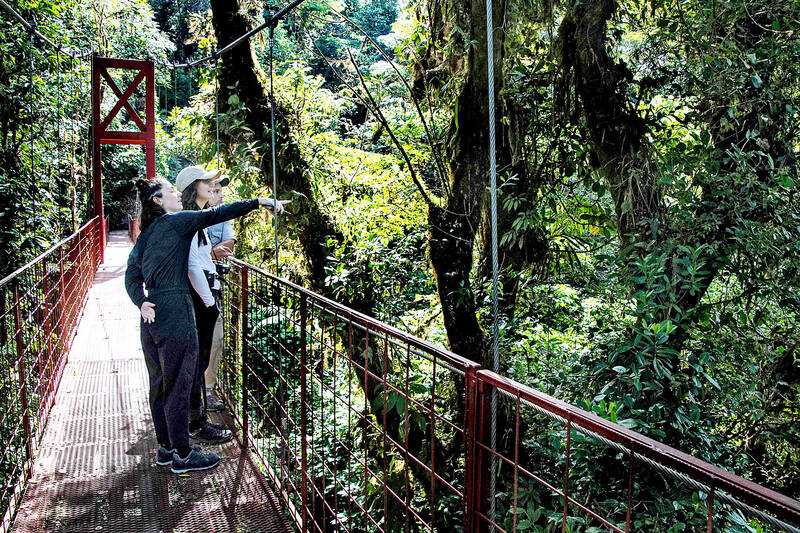The “cloud forest” of Monteverde, in the center of Costa Rica, would soon no longer be worthy of the name. Climate change threatens this unique ecosystem, and its fauna and flora face an unclear future under a brilliant blue sky.
In the forest, what a visitor should hear is the constant drip of moisture falling from the trees. Instead, it is the sound of dead branches snapping underfoot that breaks the silence on the dry trails.
The high-altitude forest is clinging to life, and it delights walkers with an infinite variety of greens under an uncomfortably bright sun.

Photo: AFP
The fog, which reigned supreme here only a short time ago, dissipates as the temperature rises, 24-year-old forest guide Andrey Castrillo said.
“The forest should be cool,” he said. “You should hear the drops falling all over the forest, but that only happens during the wettest and windiest days of the rainy season.”
Before, “there was no sun ... we had about 30 days of sunshine a year. Now we have more than 130,” he said.
At 1,400m above sea level and 140km northwest of the capital, San Jose, the private nature reserve extends over 14,200 hectares and is home to 100 species of mammals, 440 bird species and 1,200 types of amphibians.
This exceptional type of altitude forest represents only 1 percent of the world’s tropical and subtropical areas.
“Near-ground cloud cover forms when the humidity saturation is above 90 percent, with temperatures between 14°C and 18°C,” University of Costa Rica researcher Ana Maria Duran said.
Duran said she had been coming here regularly for more than 20 years.
Normally, the “almost permanent” fog gives the impression of “practically walking in the middle of the clouds,” with visibility down to barely 1 meter.
As she spoke, she stared into the forest where the temperature had risen to more than 25°C, under a blue sky where only a few clouds crowned the peaks.
“Coming to Monteverde to find such dry conditions, and not being in the clouds like it was 20 years ago when I started coming is obviously very sad,” Duran said.
Rising temperatures mean lower humidity and more sun. The mosses have dried on the tree trunks, the rivers are no more than streams and the amphibians have been the first victims of climate change.
“The decline of amphibians in cloud forests may serve as a wake-up call,” University of Costa Rica biologist Andrea Vincent said.
Already, the species Incilius periglenes, known as the golden toad, has been considered extinct since 2019 by the International Union for Conservation of Nature.
“A cloudless cloud forest, it will disappear, it has to,” Vincent said, adding that “there will be a lot of extinctions” of different species.
However, this “dispiriting scenario” can still be avoided, she said.
“Ecosystems are resilient. If we make efforts to stop climate change, it is possible that cloud forests will recover ... not during our lifetime, but perhaps for the next generations,” she said.

‘THEY KILLED HOPE’: Four presidential candidates were killed in the 1980s and 1990s, and Miguel Uribe’s mother died during a police raid to free her from Pablo Escobar Colombian presidential candidate Miguel Uribe has died two months after being shot at a campaign rally, his family said on Monday, as the attack rekindled fears of a return to the nation’s violent past. The 39-year-old conservative senator, a grandson of former Colombian president Julio Cesar Turbay (1978-1982), was shot in the head and leg on June 7 at a rally in the capital, Bogota, by a suspected 15-year-old hitman. Despite signs of progress in the past few weeks, his doctors on Saturday announced he had a new brain hemorrhage. “To break up a family is the most horrific act of violence that

HISTORIC: After the arrest of Kim Keon-hee on financial and political funding charges, the country has for the first time a former president and former first lady behind bars South Korean prosecutors yesterday raided the headquarters of the former party of jailed former South Korean president Yoon Suk-yeol to gather evidence in an election meddling case against his wife, a day after she was arrested on corruption and other charges. Former first lady Kim Keon-hee was arrested late on Tuesday on a range of charges including stock manipulation and corruption, prosecutors said. Her arrest came hours after the Seoul Central District Court reviewed prosecutors’ request for an arrest warrant against the 52-year-old. The court granted the warrant, citing the risk of tampering with evidence, after prosecutors submitted an 848-page opinion laying out

STAGNATION: Once a bastion of leftist politics, the Aymara stronghold of El Alto is showing signs of shifting right ahead of the presidential election A giant cruise ship dominates the skyline in the city of El Alto in landlocked Bolivia, a symbol of the transformation of an indigenous bastion keenly fought over in tomorrow’s presidential election. The “Titanic,” as the tallest building in the city is known, serves as the latest in a collection of uber-flamboyant neo-Andean “cholets” — a mix of chalet and “chola” or Indigenous woman — built by Bolivia’s Aymara bourgeoisie over the past two decades. Victor Choque Flores, a self-made 46-year-old businessman, forked out millions of US dollars for his “ship in a sea of bricks,” as he calls his futuristic 12-story

A man has survived clinging to the outside of an Austrian high-speed train, Austria’s state railway said on Sunday, reportedly after it left while he was having a cigarette break. The man late on Saturday grabbed onto the outside of the train at St Poelten, west of Vienna, and was later taken onboard after the train performed an emergency stop, railways spokesman Herbert Hofer said. “It is irresponsible, this kind of thing usually ends up with someone dying,” he said. “And you’re not just putting yourself in danger, if you end up under the train there’s rescuers, there’s police, fire